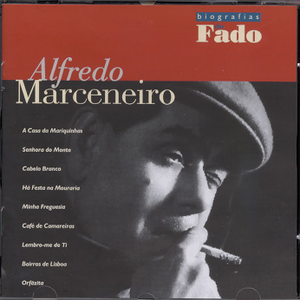On June 10, 1984, he was awarded posthumously Commander of the Order of Infante D. Henrique by former President of the Portuguese Republic, General Ramalho Eanes.
Bairros de Lisboa
Alfredo Marceneiro Lyrics
Jump to: Overall Meaning ↴ Line by Line Meaning ↴
De duas rimas de Fado
Aos Bairros com tradição
Da boémia e do passado
Não quero entrar em despique
Mas se o quizesse fazer
Seria Campo d´Ourique
O primeiro a inaltecer
Mas o Bairro de mais fama
Mais Fadista mais Marujo
É a linda e velha Alfama
Do Norberto de Araújo
Lembra mais a nostalgia
Embora do mesmo agrado
Dum resto de Mouraria
Que ainda tem sabor a Fado
Bairros que o Povo acarinha
Tornam mais bela e fagueira
Esta Lisboa vélhinha
Tão vélhina e menineira
Esse Povo audaz boémio
Que Viveu em sobressalto
Era amigo, era irmão gémeo
Dos faias do Bairro Alto
Entre os bairros de Lisboa
Há um que é sempre criança
Vê lá bem se a Madragoa
Não Vive cheia de esperança
No pensamento nos passa
Essa boémia sem par
Que foi de Belém á Graça
De Benfica ao Lumiar
A tradição nunca finda
Ainda ninguém a matou
E o presente vive ainda
Do passado que ficou
E pronto a volta está finda
Para que andar mais á toa
Se Lisboa é toda linda
Se o nosso Bairro é LISBOA
The lyrics of the song Bairros de Lisboa by Alfredo Marceneiro talk about the different neighborhoods of Lisbon, Portugal, and their rich cultural heritage, particularly in music and nightlife. The songs enlist the singer and his companion to walk through the city, holding hands and singing two classic Fado tunes. The first neighborhood mentioned is Campo d'Ourique, a hilly residential area known for its lively markets and coffee shops, and also for the several figures from Portuguese literature who have called it home. However, the most famous Fado neighborhood, according to the song, is Alfama, located on the slopes between the Castle of Saint George and the Tejo river. Alfama is a picturesque maze of narrow streets and alleys, adorned with colorful tiles and lined with bars and restaurants where Fado singers perform nightly. The neighborhood has a strong sense of community, and the song praises it for its maritime traditions and the influence of the legendary Fado composer Norberto de Araújo.
The lyrics go on to describe other beloved neighborhoods, such as Mouraria, historic quarters that have undergone significant transformations, and newer districts like Madragoa that have retained their bohemian character. Marceneiro's song emphasizes the importance of these neighborhoods in shaping the identity of Lisbon and the Portuguese people: they embody both the city's past and present, and they are valued and cherished by locals and visitors alike. The final verse is a celebration of Lisbon itself as a beautiful and vibrant city, and of the singer and his companion's strong bond, forged by their love of music and poetry.
Line by Line Meaning
Vamos ambos pela mão
Let us go hand in hand
De duas rimas de Fado
With two rhymes of Fado
Aos Bairros com tradição
To the neighborhoods with tradition
Da boémia e do passado
Of bohemia and the past
Não quero entrar em despique
I don't want to get into a dispute
Mas se o quizesse fazer
But if I wanted to
Seria Campo d´Ourique
It would be Campo d'Ourique
O primeiro a inaltecer
The first to praise
Mas o Bairro de mais fama
But the most famous neighborhood
Mais Fadista mais Marujo
Most Fado-esque, most seafaring
É a linda e velha Alfama
Is the beautiful and old Alfama
Do Norberto de Araújo
Of Norberto de Araújo
Lembra mais a nostalgia
Brings more nostalgia to mind
Embora do mesmo agrado
Although of the same liking
Dum resto de Mouraria
From the remainder of Mouraria
Que ainda tem sabor a Fado
That still has the taste of Fado
Bairros que o Povo acarinha
Neighborhoods that the people cherish
Tornam mais bela e fagueira
Make it more beautiful and lively
Esta Lisboa vélhinha
This old Lisbon
Tão vélhina e menineira
So old and youthful
Esse Povo audaz boémio
This audacious, bohemian people
Que Viveu em sobressalto
Who lived in turmoil
Era amigo, era irmão gémeo
Were friends, were twin brothers
Dos faias do Bairro Alto
Of the Fado singers from Bairro Alto
Entre os bairros de Lisboa
Among the neighborhoods of Lisbon
Há um que é sempre criança
There is one that is always a child
Vê lá bem se a Madragoa
Take a good look at Madragoa
Não Vive cheia de esperança
Doesn't live full of hope
No pensamento nos passa
In our minds it crosses
Essa boémia sem par
That unparalleled bohemianism
Que foi de Belém á Graça
That went from Belém to Graça
De Benfica ao Lumiar
From Benfica to Lumiar
A tradição nunca finda
The tradition never ends
Ainda ninguém a matou
No one has killed it yet
E o presente vive ainda
And the present still lives
Do passado que ficou
From the past that remained
E pronto a volta está finda
And the tour is over
Para que andar mais á toa
Why walk around aimlessly
Se Lisboa é toda linda
If Lisbon is all beautiful
Se o nosso Bairro é LISBOA
If our neighborhood is LISBON
Contributed by Tristan R. Suggest a correction in the comments below.

vmvini
adoro essa canção
Alejandro Mosquera Souto
Quanta formosura